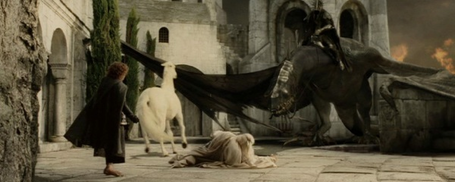As usual, crossposted from my livejournal/Dreamwidth account. I’m still catching up, and happy to be back here! I wrote this before The Rings of Power aired, and will shortly be writing a more comprehensive review.
t's been fascinating and disheartening to observe all the noise about the upcoming Rings of Power from
Amazon. Honestly, it's a lesson in social media and how toxic it can
be. There really does seem to be something horribly toxic about social
media these days. People seek reactions, and outrageousness and cruelty
get reactions. This happens on all sides of every argument, as far as I
can see. It's something I think we all have to work to avoid. But here's
what I wanted to say:
It seems to me, when adapting a work of
art, there is surface fidelity and deep fidelity. Deep fidelity matters
more. To give one example, some fans are outraged by sword-wielding youg
Galadriel, but I am really looking forward to seeing her journey. Hers,
as much as Frodo's, is a story of redemption and sacrifice. We see her
redeemed, a mature and wise woman renouncing power, in LOTR. In The Rings Of Power,
she is still young (for an elf) and just at the start of what will be a
great character arc. And I think that character arc is there, in
Tolkien's words!
Some fans who are slamming the upcomingshow are
Tolkien purists. Fans like these, who love the books, would naturally
object to any interpretation that wasn't by the letter. I can absolutely
understand that point of view.
Bit some of the angriest fans
seem to be fans of Jackson's movies. They are claiming Jackson was true
to Tolkien and didn't inject politics into the movies. Is this true?
Don't
get me wrong--I love the films and think they are a great achievement.
But they are not always deeply faithful to Tolkien's books and sometimes
they flat-out contradict them.
I've
already blogged about this, several years ago when the movies came out.
I pointed out that Jackson, for all his virtues as a filmmaker, was
blind to the virtue of courtesy. That'st true, but there's more. Here
are some very significant alterations:
1. The character assassination
of Denethor, who, in the book, was corrupted by pride and despair, but
nevertheless loved both his sons and took steps to defend his city.
2. The character assassination of Faramir.
3. The minimizing of Sam's role as ringbearer. In fact, the minimizing of his role altogether.
4. Aragorn's beheading of the Mouth of Sauron.
5. Gandalf's use of violence against Denethor.
6. And, most egregious of all, this scene:

https://imgur.com/jn260S8
In the film, Gandalf is helpless before the Witch-King of Angmar when
that black rider enters the city. Not so in the book. Gandalf stands his
ground, and then Rohan comes. To Tolkien, as a practising Catholic,
love was stronger than hate and hope stronger than despair. The
Witch-King's power is despair, but both Gandalf and the horns of the
Rohirrim symbolize hope. It isn't blind hope; it doesn't deny the
cruelty or the power of evil. But the hope is there, and it is
victorious.
To change this is a fundamental misreading of
Tolkien, IMHO. For all that Jackson got right, he got Tolkien's theology
very wrong in this scene--and also in his slightling of Sam, and in the
ridiculous mess he made of the stairs of Cirith Ungol. In other words,
though I love the movies, I love the books a lot more.
And it is
just possible the new series may be truer to Tolkien's essentials than
the movies were, even if the TV show differs more in minor, surface
details.
Besides, why shouldn't there be elves and dwarves of color in Midde-Earth?
